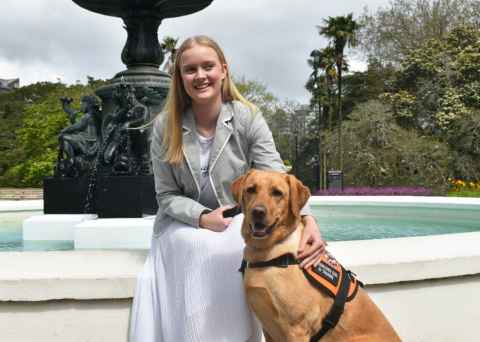Meet Sophie
Sophie has a passion for studying law, but she can’t imagine doing it without Frankie by her side.

If you see Sophie around campus, you’ll almost definitely meet her assistance dog, Frankie, too.
"She comes to all my classes. She's with me 24/7,” Sophie says. “There's very rarely a moment where she's not there. When she's not there, I feel like I've left half of me behind.”
Frankie is one of the supports Sophie uses as someone living with functional neurological disorder (FND).
"Her job is to, number one, keep me safe when I have a seizure. Her primary function is as an alert that I have a medical condition and that I need some attention and help.”
Before starting at the University, she had some uncertainty about how she might get by in a new environment. A few weeks before courses started, she got a call from a disability case manager from Ratonga Hauātanga Tauira | Student Disability Services (SDS), who provided her with an Access Plan*.
“Once the plan was sent to me, then I could send that to whoever I wanted to,” she says. “It was different to school where it would normally bypass me. That was quite nice to have that kind of control over it."
The notetakers are also a huge help. Sometimes being at the lecture is all I can do, rather than being there, listening, and trying to write notes at the same time.
She is currently in her first year of a conjoint Bachelor of Law and Arts, majoring in Criminology, Politics and International Relations. She took an interest in these subjects after talking to her uncle Trevor.
“I knew that he was a lawyer. And for some reason I thought he was really cool. I only saw him like three or four times in my whole life. He lived in Wellington and had an office full of books.”
At the moment she is interested in criminal defence. She says having an invisible disability has given her new insight into some of the injustices in our world.
"I guess there's an element of people making judgments about guilt and also justice based on incomplete knowledge of someone's experience,” she says.
“It's an interesting thing I didn't expect to be able to relate to.”
* An Access Plan is an individualised document that provides details of the specialist services, study and assessment adjustments provided to the student, which they can share with appropriate staff.